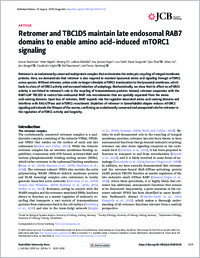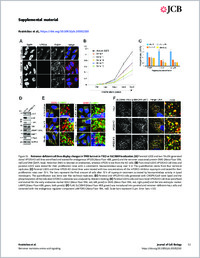Retromer and TBC1D5 maintain late endosomal RAB7 domains to enable amino acid–induced mTORC1 signaling
- Kvainickas, Arunas Center for Biological Systems Analysis, University of Freiburg, Freiburg, Germany
- Nägele, Heike Center for Biological Systems Analysis, University of Freiburg, Freiburg, Germany
- Qi, Wenjing Faculty of Biology, University of Freiburg, Freiburg, Germany
- Dokládal, Ladislav Department of Biology, University of Fribourg, Fribourg, Switzerland
- Jimenez-Orgaz, Ana Center for Biological Systems Analysis, University of Freiburg, Freiburg, Germany
- Stehl, Luca Center for Biological Systems Analysis, University of Freiburg, Freiburg, Germany
- Gangurde, Dipak Faculty of Biology, University of Freiburg, Freiburg, Germany
- Zhao, Qian Faculty of Biology, University of Freiburg, Freiburg, Germany
- Hu, Zehan Department of Biology, University of Fribourg, Fribourg, Switzerland
- Dengjel, Jörn Department of Biology, University of Fribourg, Fribourg, Switzerland
- De Virgilio, Claudio Department of Biology, University of Fribourg, Fribourg, Switzerland
- Baumeister, Ralf Faculty of Biology, University of Freiburg, Freiburg, Germany
- Steinberg, Florian Center for Biological Systems Analysis, University of Freiburg, Freiburg, Germany
-
02.09.2019
Published in:
- The Journal of Cell Biology. - 2019, vol. 218, no. 9, p. 3019–3038
English
Retromer is an evolutionarily conserved multiprotein complex that orchestrates the endocytic recycling of integral membrane proteins. Here, we demonstrate that retromer is also required to maintain lysosomal amino acid signaling through mTORC1 across species. Without retromer, amino acids no longer stimulate mTORC1 translocation to the lysosomal membrane, which leads to a loss of mTORC1 activity and increased induction of autophagy. Mechanistically, we show that its effect on mTORC1 activity is not linked to retromer’s role in the recycling of transmembrane proteins. Instead, retromer cooperates with the RAB7-GAP TBC1D5 to restrict late endosomal RAB7 into microdomains that are spatially separated from the amino acid– sensing domains. Upon loss of retromer, RAB7 expands into the ragulator-decorated amino acid–sensing domains and interferes with RAG-GTPase and mTORC1 recruitment. Depletion of retromer in Caenorhabditis elegans reduces mTORC1 signaling and extends the lifespan of the worms, confirming an evolutionarily conserved and unexpected role for retromer in the regulation of mTORC1 activity and longevity.
- Faculty
- Faculté des sciences et de médecine
- Department
- Département de Biologie
- Language
-
- English
- Classification
- Biological sciences
- License
- License undefined
- Identifiers
-
- RERO DOC 327387
- DOI 10.1083/jcb.201812110
- Persistent URL
- https://folia.unifr.ch/unifr/documents/308126
Other files
Statistics
Document views: 82
File downloads:
- vir_rtm.pdf: 198
- vir_rtm_sm.pdf: 94
- vir_rtm_sm2.txt: 40


